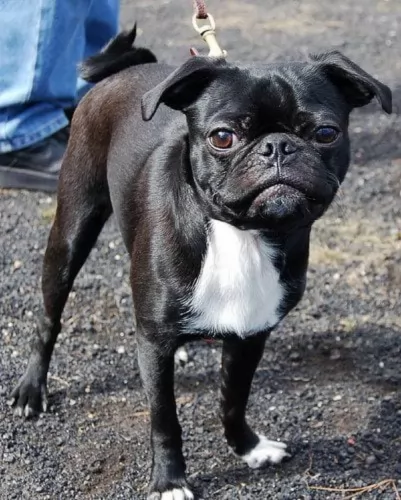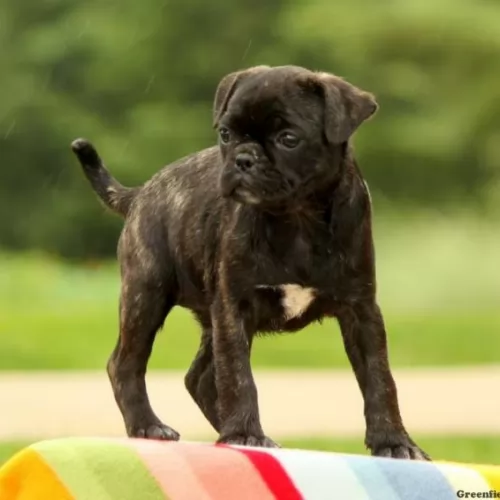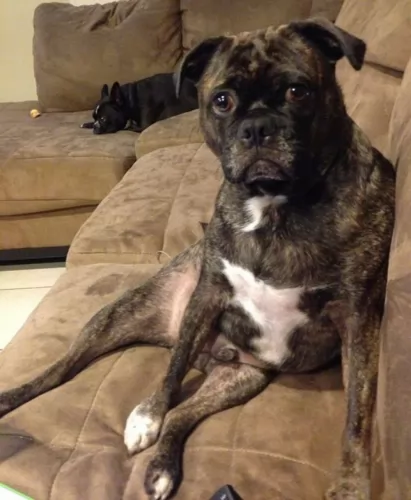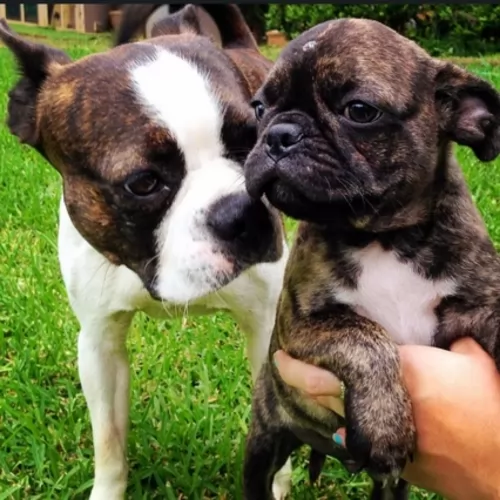 Petzlover
PetzloverBoth Bugg and Walker Hound are originated from United States. Bugg may grow 31 cm / 12 inches shorter than Walker Hound. Bugg may weigh 21 kg / 46 pounds lesser than Walker Hound. Both Bugg and Walker Hound has same life span. Both Bugg and Walker Hound has same litter size. Bugg requires Moderate Maintenance. But Walker Hound requires Low Maintenance
 The Bugg is generally a cross between a Boston Terrier and a Pug. There is no clear history in terms of who started this hybrid dog that was recognized initially be the IDCR or International Designer Canine Registry in 2009. This very cute little dog has become increasingly popular in a very short period of time. Crossing these two breeds created a small dog that loves to sit in your lap as well a romp and play.
The Bugg is generally a cross between a Boston Terrier and a Pug. There is no clear history in terms of who started this hybrid dog that was recognized initially be the IDCR or International Designer Canine Registry in 2009. This very cute little dog has become increasingly popular in a very short period of time. Crossing these two breeds created a small dog that loves to sit in your lap as well a romp and play.
At this time the Bugg is recognized by several of the hybrid and designer registries and clubs. This would include in addition to the IDCR:
The Walker Hound is actually two different breeds today both descendant from the original Walker. They are the Running Walker Hound and the Treeing Walker Coonhound and mark their ancestors as the American Foxhound and the English Foxhound. The Treeing Walker is a breed developed in the United States when a “Tennessee Lead Dog” was crossed with a Walker Hound. The Running Walker is considered a Foxhound not a coonhound. They Running Walker does not have a treeing instinct and is not as common in hunting in the southern US as the Treeing Walker Coonhound.
In 1945 the United Kennel Club (UKC) recognized the Treeing Walker Coonhound and by the AKC (American Kennel Club) in 2012. They were developed to hunt and “tree” racoons – so the coonhound label. They also are capable of hunting bears, deer, bobcats and mountain lions. Their baying voice is distinctive that even at a great distance a hunter can recognize the voice of his dog.
Both types of Walkers are calm, gentle and friendly family dogs. The original Walker Hounds were bred in Kentucky by John Walker and George Maupin. The Walker Coonhound, Treeing was recognized as part of the English Coonhound breed by the UKC in 1905. In 1945, they were then recognized as their own breed by the UKC.
They have become the most popular hound competitor in coon hunt competitions. They are known for speed and an ability to catch more racoons in a shorter period of time than any other coonhound. They also tree squirrels, cougars. Opossums, roof rats and skunks.
 This cross between the Boston Terrier and Pug can have several different looks depending upon whether the individual dog resembles the Pug or the Boston more. Some usual but not always physical characteristics include curly tails, droopy ears and a stocky body in a small dog. They usually have soft, straight coats. Most Buggs look more like the Boston than the Pug although they have the more smashed muzzles and shorter legs of the Pug. The heads are round with almond shaped eyes.
This cross between the Boston Terrier and Pug can have several different looks depending upon whether the individual dog resembles the Pug or the Boston more. Some usual but not always physical characteristics include curly tails, droopy ears and a stocky body in a small dog. They usually have soft, straight coats. Most Buggs look more like the Boston than the Pug although they have the more smashed muzzles and shorter legs of the Pug. The heads are round with almond shaped eyes.
This working dog is tall and lean with the males being somewhat larger than the females. They have broad skulls and hanging, long ears with a long muzzle. They have a soft expression in their dark eyes, straight legs and compact cat-like feet. The coat is smooth, glossy and fine. The traditional color is a tricolor or a bi-color in white with black and tan markings. The bicolors are white and tan or white and black. Their speed comes from the long , powerful and muscled legs and hindquarters along with the frame that is lean and streamlined.
 This crossbreed is easily trainable and highly intelligent. They might be stubborn like the Boston or devoted like the Pug. They can have characteristics of both parents and be loving, playful lapdogs. They love to play with children, but they can be territorial like the Boston. The Bugg is a small dog with a big attitude. They are affectionate and sweet, friendly towards people and other animals. Since the Boston and the Pug have very similar characteristics and temperament, you can have a pretty good idea what your Bugg will be like.
This crossbreed is easily trainable and highly intelligent. They might be stubborn like the Boston or devoted like the Pug. They can have characteristics of both parents and be loving, playful lapdogs. They love to play with children, but they can be territorial like the Boston. The Bugg is a small dog with a big attitude. They are affectionate and sweet, friendly towards people and other animals. Since the Boston and the Pug have very similar characteristics and temperament, you can have a pretty good idea what your Bugg will be like.
2.Special talents Walkers are capable of covering a lot of ground in a hurry. Speed and treeing instinct.
The Treeing Walker Coonhound is a fairly healthy breed needing to watch out for accidents on the hunting trail from shrubs, brush and tree limbs. They can become tick infested if you are not careful, especially in their long ears that flop on the side of their head. Clean their ears weekly and check them after every run in the woods.
They are also prone to hip dysplasia and eye issues. Hip dysplasia can cause lameness and/or arthritis. Before to keep the ear clear of debris and wax to avoid ear infections.
 Buggs love to eat and will anything you give them and some things that you don’t. They can become obese very easily so watch their food intake. These small dogs should be eating food made for small dogs. Feed them only ¾ to 1 and ½ cups of dry food per day split into two meals.
Buggs love to eat and will anything you give them and some things that you don’t. They can become obese very easily so watch their food intake. These small dogs should be eating food made for small dogs. Feed them only ¾ to 1 and ½ cups of dry food per day split into two meals.
The Bugg can inherit health problems from either the Boston or the Pug, or they may be healthier than either parent breed. Both of these parent breeds are given to Brachycephalic issues due to their mashed faces. They could face respiratory issues or eye issues because of this.
The Bugg is a very energetic and playful dog. They love to run, play and go on walks. Just one walk or play session per day is enough exercise for this little dog. You can easily have your play time inside if you don’t have a fenced yard. Because of their faces and breathing issues do not let them get overheated.
1Feeding the puppy – don’t overfeed. Feed quality medium size breed 3-4 small meals per day
2.Feeding the adult – don’t overfeed. Feed quality medium size breed 1-2 small meals per day
running or hiking companion. long daily walks at a minimum. He loves to run and play with his family. Hunting and “coon trials” are his specialty and best ways to get exercise. He needs to run